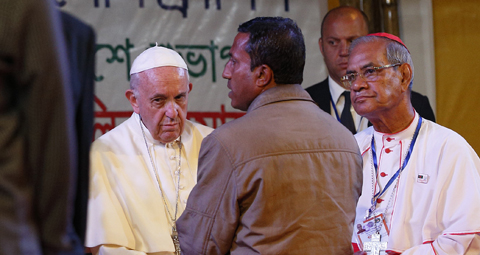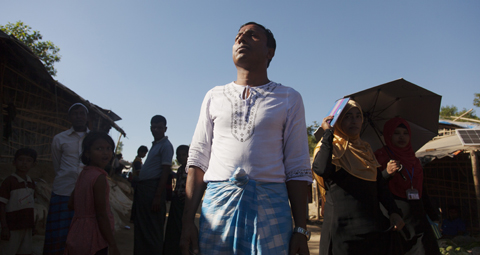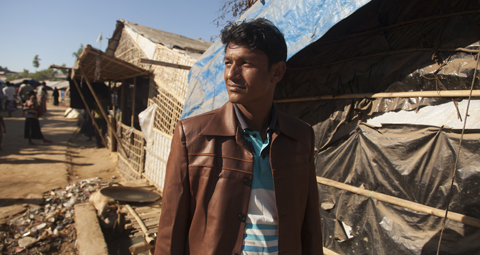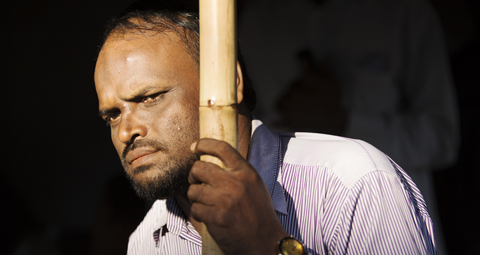BY Daniel Harkins | December 22 | ![]() 0 COMMENTS
0 COMMENTS ![]() print
print
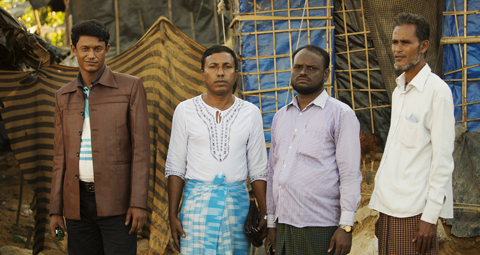
Prayers for the Rohingya
DANIEL HARKINS continues his report from Bangladesh which looks at the plight of the Rohngya refugees forced to flee from their home in Myanmar and speaks to those who met Pope Francis
Iask Syedul Islam if there is some shade where we can talk outside of the burning 30C heat. He guides me away from the small cemetery we are standing at next to a garbage dump in Bangladesh’s Kutupalong refugee camp. We walk along narrow, unpaved, uneven dirt paths that wind through a mass of tiny, dark makeshift homes crowding every other available piece of land. We enter a café. The building is bustling with Rohingya refugees, each one of whom fled across the border from Myanmar (Burma), pursued by government military forces burning their villages and killing and raping their friends and relatives. At least 6700 Rohingya were killed in one single month this year, according to Médecins Sans Frontières. Now, 858,590 of them live in camps across the border, mainly in Kutupalong.
Mr Islam, 50, was one of 16 refugees who left the camp with a police escort on December 1, headed for the Bangladesh capital city of Dhaka, where they met Pope Francis.
There the Holy Father asked them for forgiveness for the ‘indifference of the world’ to their suffering, and referred to them as ‘Rohingya,’ a word disputed by the Myanmar Government who consider as illegal immigrants the generations of people who live in Myanmar’s Rakhine State.
“This man is the peacemaker in the world,” Mr Islam said of his meeting with the Pope. “He is a great leader and through him peace will come to our people.”
The Kutapalong refugee camp is accessed through a police checkpoint, which ensures the Rohingya refugees can’t leave. Those who make the perilous journey across the border are held in temporary processing centres—a sandy patch of ground roughly fenced off with bamboo poles—before being taken to the camp. They may have escaped the horrors of their homeland but their refuge seems a lot like a cage.
The small huts that serve as homes in the camp can house nine people, without any light, and the cooking fires fill with a suffocating smoke the rooms divided by curtains. Poor sanitation and the threat of disease are just one of the problems facing the refugees, along with a looming winter and rains which could cause landslides and wash away the little these people have.
But there is life in the camp: children, who make up 60 per cent of the inhabitants —many of them orphans—play in rough patches of open ground, flying handmade kites.
Trade has sprung up in this densely populated city, and the café in which I speak to the refugees wouldn’t be too out of place in a small town. The roof is low, the floor is dirt, and the seats are no more than rickety stools, but a waiter brings me a shot glass filled with sweet tea and my translator receives a small bowl of vegetables.
Like every refugee I spoke to, Mr Islam has a horrifying story to tell.
“I saw one 22-year-old girl raped by the military,” he said. “It was very difficult —I can see but I can do nothing. The military was surrounding us. I couldn’t save her.”
Mr Islam said the ‘genocide’ against his people started in 2012, continued in 2016 and became extreme in 2017. The current influx of 646,000 Rohingya took place from August 25 this year, but hundreds of thousands have previously fled across the border over the last few decades.
Mr Islam said the military were ‘killing people, cutting and throwing them in ditches, burning our houses and demolishing our businesses.’ With 4,000 other people from his area, Mr Islam came across the border three months ago. His children, he said, scream and cry a lot now, and his wife, who ‘built everything bit by bit and had to leave it all,’ suffers from depression.
The military pursued and fired on them as they entered the jungle, where they stayed in hiding for three nights, before crawling to the border and crossing the Naf River by boat. Not everyone in their group made the journey alive.
From the higher points of the refugee camp, the refugees say they can still see the smoke from their burning homes.
Khirul Amin’s house was one of those burned by the military. He rebuilt it bit by bit over the next three months. The military burned it again. After his brother and some of his neighbours were killed, he decided to leave the land of his birth behind.
The 52-year-old said he left the meeting with Pope Francis believing the Holy Father will do something to help his people. He was happy to meet the Pope, he said, as the pontiff is connected to the Catholic organisations helping in the camps.
One of those, Caritas Bangladesh, is helping the refugees thanks in part to the goodwill of the people of Scotland. Caritas Internationalis operates in this country as the Scottish Catholic International Aid Agency (SCIAF) and parishioners and school pupils have raised more than £160,000 in recent months for those fleeing what the UN has called a textbook example of ethnic cleansing.
Food, cooking instruments, sleeping mats and blankets have all been provided by SCIAF, and structural work to combat the risks in the camps—the use of indoor fires, poor sanitation and disease that may follow, and looming possibility of landslides—have all been supported by the Scottish charity.
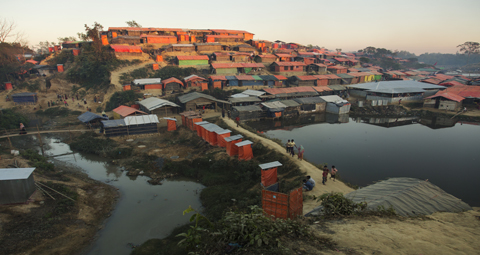
Alistair Dutton, the director of SCIAF, urged the people of Scotland not to ignore the suffering of an often-overlooked people.
“It’s all about people and how we value and care for people,” he said. “Why should people in the UK do something? Because it’s about respecting people. Even more so, why should Christians do something? Because there is no part of the Gospel that doesn’t include some instruction that this is exactly what we should be doing.”
Mr Dutton is realistic about the impact of the Pope’s visit on the Rohingya. “Will Pope Francis’ visit change anything? I honestly don’t know. The track record of Myanmar is that despite significant diplomatic pressure in the past they haven’t addressed the situation of minorities in the country. But you have to stand up for truth even if it doesn’t change anything. It is about speaking truth to power and calling things out when they are wrong and that is valuable. And it will have made some difference —the Rohingya know they are not forgotten.”
One of those helped by SCIAF is 30-year-old Lalu. He is a confident-looking man dressed in a sharp burgundy jacket. As I talk with the other men who met the Pope, he laughs and jokes with friends in the cafe. But two months ago Lalu stood immobilised by the shock of what he had seen, barely moving all day, before others gently picked him up and carried him away.
His life was thrown into turmoil when Burmese military attacked his village. He was forced to flee to another area. Shortly afterwards, at 10 o’clock in the morning, the military encircled the village and attacked from two sides. They set fire to houses, and shot those who ran out. Some plunged into a nearby pond; others jumped from the hill their houses were on.
A group of the villagers fled into the jungle, while Lalu hid nearby. He said he saw the military round-up around 80 people and told them to enter a building, where they would be safe. Instead, they doused it in petrol and set it alight. As those who escaped watched the military’s assault, one of Lalu’s friends was shot by a sniper. He ran.
“The people were crying and jumping like chickens,” he said. “It was very sad. I became fully blank.
I was standing in the same spot from morning to evening, thinking about what happened in front of my eyes.”
Myanmar is a majority Buddhist country, and the terrible violence against the Rohingya is in part practised and endorsed by local Buddhist leaders. The refugees’ meeting with the Pope was inter-religious, and one Buddhist leader told those present that his religion does not endorse or in any way justify the killings.
Kamal Hossain, 41, also met the Pope. Now another refugee statistic, he was once the chairman of his local union area. “As I was a union leader I had to take the decision to save other people,” he said. “So I gathered the people and took the initiative to come [to Bangladesh]. They killed my brother, Muhammad Ayaz, and they were killing the elder and young people first, so the others would do nothing.”
As a local leader, Mr Hossain had access to census figures showing 9,675 people were in his village. 80 per cent of them were killed.
“They were burned,” he said. “The bodies were thrown into ditches. We couldn’t take the water because it was filled with blood. We had no food. They raped my daughter-in-law in front of me. It was very sad.”
The horror stories above are in the past for the Rohingya refugees, but their present is one of liberty denied and their future holds little promise. Christmas in Kutupalong will not be a happy one. As the world’s attention moves away from Bangladesh this holy season, the people in Kutupalong risk being forgotten and ignored.
“Jesus Christ today is called Rohingya,” Pope Francis told a meeting of Jesuits during his visit to Myanmar. “Today there is much discussion about how to save the banks. But who saves the dignity of men and women? Nobody cares about people in ruins any longer. Unfortunately, in Europe there are countries that have chosen to close their borders. The most painful thing is that to take such a decision they had to close their hearts.”
– To help the Rohingya refugees, donate to SCIAF’s emergency appeal at www.sciaf.org.uk or call 0141 354 5555
Photos by Simon Murphy



